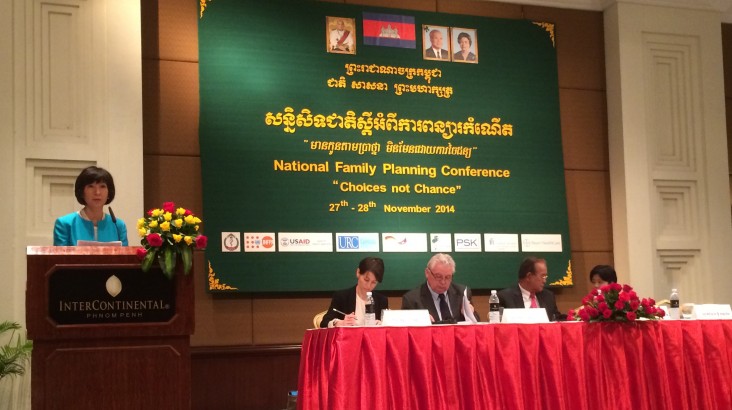
Your Excellency Professor Eng Huot, Secretary of State, Ministry of Health
Professor Tung Rathavy, Director of the National Maternal and Child Health Center and Manager of the National Reproductive Health Program, Ministry of Health
Ms. Margot Morris, Australia Department of Foreign Affairs and Trade Representative
Dr. Marc Derveeuw, United Nations Population Fund Representative
Distinguished colleagues, ladies and gentlemen
I am delighted to join you today to participate in Cambodia’s first National Family Planning Conference. I must congratulate the Royal Government of Cambodia’s Ministry of Health and, especially, the National and Maternal and Child Health Centre, as well as the supporting partners whose dedication to protecting the health and wellbeing of Cambodian women and children has made this day possible. The U.S. Embassy, through the support of USAID and other U.S. government agencies, has historically been one of Cambodia’s strongest partners in health.
Globally, nearly 300,000 women and over 3 million infants die each year from complications in pregnancy and birth – with unplanned pregnancies often carrying the highest risk. Here in Cambodia, as evidenced by our last Demographic and Health Survey, 206 Cambodian women needlessly lose their lives for every 100,000 live births -- usually from preventable and treatable causes.
Health economists have the data to prove that Family Planning is one of the most cost-effective investments a nation can make to improve the health and save the lives of mothers and children. With good data in hand, the challenge turns to translating knowledge into action. Our actions must ensure couples have the necessary information, access and resources to decide for themselves, whether, when and how many children to have.
At the 2012 London Summit on Family Planning, leaders from around the world, including Cambodia, committed themselves to expanding contraceptive access to an additional 120 million women and girls in the world’s 69 poorest countries by the year 2020. The following year, 8.4 million additional women and girls took up modern contraception. Here in Cambodia, we strive to reach our own ambitious goals by expanding services and improving access to information so that couples can choose to time and space their births according to their own needs.
In Cambodia, health centers and private sector outlets provide short-term methods, with pills and condoms readily accessible nationwide. The use of long-term methods is more of a challenge, but your collective effort, it is increasing gradually. But the unmet need for modern contraception remains high -- especially for rural and vulnerable populations.
Ladies and gentlemen:
We have set ambitious health goals for Cambodia and are working together to achieve them. The public sector, the private sector, and supporting partners all have distinct roles to play. This conference provides an opportunity to re-double our efforts to improve family planning and ensure all women and families in Cambodia have access to quality and affordable services for family planning, maternal and child health.
Health care providers – whether public or private sector -- should take every appropriate opportunity to ensure families are informed about the options related to Family Planning. This is particularly important for care after pregnancy.
In communities across Cambodia, we need to strengthen our approaches to delivering information to break down myths and misconceptions. Whether through effective one-on-one communication between well-trained Village Health Support Groups or in a high-quality mass communication campaign – information delivered at the right time in the right way will dispel myths and create demand for modern contraception.
I applaud the Royal Government of Cambodia for demonstrating increased commitment to sustaining the supply of family planning commodities. The addition of a budget line for contraceptives into the national budget is a major step in ensuring long-term commodity security. An effective Supply Chain Management System is critical to making sure these commodities reach health facilities and end-users in an efficient manner.
Today, we reconfirm our commitment and collaboration to safeguard the health and wellbeing of Cambodian families. The public, private, and non-government sectors all have critical roles to play in expanding access to high-quality family planning products and services. No one sector can do it alone. USAID will continue to provide assistance and support across all sectors. This includes building the capacity of health care providers, mobilizing communities to spread awareness of the options, supporting mass media and innovative campaigns to reach youth audiences, and linking family planning services to financing options to reduce cost barriers. These contributions, all carried out in close partnership with many of you here today – especially the Royal Government of Cambodia – will help us to ensure that every woman has the tools she needs to safeguard her health of her children.
Thank you and I wish you all a very successful and productive conference.
Related Speeches
- Remarks by Polly Dunford, Mission Director, USAID Cambodia, Launch Event of Feed the Future Cambodia Harvest II
- Remarks by Christina Lau, Deputy Director, Office of Public Health and Education, USAID/Cambodia, Opening Ceremony of the Kick-Off Workshop for “One Health Workforce”
- Remarks by Veena Reddy, Deputy Mission Director, USAID Cambodia, EPIC Showcase







Comment
Make a general inquiry or suggest an improvement.